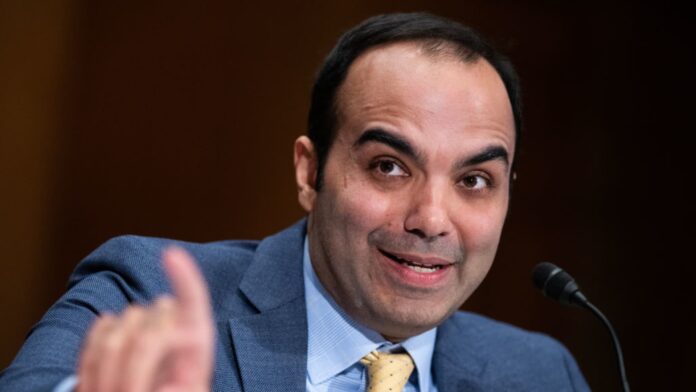Rohit Chopra, Director of the CFPB, testifies during the Senate Committee on Banking, Housing and Urban Affairs hearing entitled “Semi-Annual Report of the Consumer Financial Protection Bureau to Congress” on November 30, 2023 in the Dirksen Building.
Tom Williams | Cq-roll Call, Inc. | Getty Images
The Consumer Financial Protection Bureau issued a final version of a rule Thursday that says it will soon oversee nonbank companies that offer financial services such as payments and wallet apps.
Tech giants and payments companies that process at least 50 million transactions annually will fall under the review, which is designed to ensure that the newer entrants are complying with the laws that banks and credit unions adhere to, the CFPB said in a news release.
According to the CFPB, seven non-banks qualify for the new exam. This includes payment services from Apple, Google And Amazon, as well as fintech companies, including PayPal And block and peer-to-peer services Venmo and Zelle.
While the CFPB already had some authority over digital payment companies due to its oversight of electronic funds transfers, the new rule allows it to treat technology companies more like banks. It requires companies to be subject to “proactive audits” to ensure compliance with legal requirements and to request records and interview employees.
“Digital payments have moved from novelty to necessity and our oversight must reflect that reality,” said CFPB Director Rohit Chopra. “The regulation will help protect consumer privacy, prevent fraud and prevent illegal account closures.”
A year ago, the CFPB said it wanted to expand its oversight to technology and fintech companies that offer financial services but have avoided greater scrutiny by partnering with banks. Americans are increasingly using payment apps as de facto bank accounts, storing cash and making everyday purchases on their mobile phones.
The most popular apps covered by the rule collectively process more than 13 billion consumer payments per year and enjoy “particularly strong adoption among low- and middle-income users,” the CFPB said Thursday.
“What began as a convenient alternative to cash has grown into a major financial tool, processing over a trillion dollars in payments between consumers and their friends, families and businesses,” the regulator said.
The original proposal would have subjected companies that process at least 5 million transactions annually to some of the same audits that the CFPB conducts on banks and credit unions. That threshold was raised to 50 million transactions in the final rule, limiting expanded authority from about 17 companies to just seven, the agency said Thursday.
Payment apps that only work with a specific merchant, e.g Starbucksare excluded from the regulation.
The new CFPB rule is one of the rare cases in which the U.S. banking industry has publicly supported the regulator's actions; Banks have long believed that technology companies entering the financial services space should face greater scrutiny.
The CFPB said the rule will take effect 30 days after it is published in the Federal Register.
It is unknown whether the incoming Trump administration will decide to modify or scrap the new rule, but it is possible that the expanded oversight of tech companies will be consistent with future CFPB leadership.




















